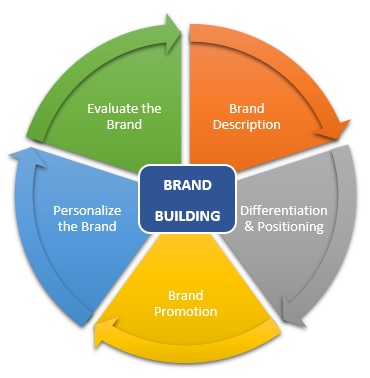Brand Building
Definition, Importance & Process
This article covers meaning & overview of Brand Building from marketing perspective.
What is meant by Brand Building?
Brand Building is generating awareness, establishing and promoting company using strategies and tactics. In other words brand building is enhancing brand equity using advertising campaigns and promotional strategies. Branding is crucial aspect of company because it is the visual voice of the company. Goal of brand building is creating a unique image about the company.
Importance of Brand Building
Brand building can be initiated with a well thought brand identity which can help create a strong brand image which goes a long way in consolidating the brand.
Brand Building comprises of creating value to consumers that how consumers feel, think and know about your brand. There are three popular brands known-
• Product brand: A physical product or items or goods are a product brand. Brand building is ensuring a good quality product is given to the customer along with good brand visibility, packaging, warranty etc. All these cumulatively help in brand building. Example of product brands are Adidas, Rolex etc
• Service Brand: A non-tangible offering is a service brand like telecom service, ecommerce etc. In this case, brand building is most dependent on the experience that a customer gets. Example of service brands are McDonald’s, Starbucks etc
• Retail Brand: Retail brands are a combination of service & product i.e. products are sold through a service offering. Hence brand building has to ensure good customer experience as well as high quality products. Example of retail brands are Tesco, Walmart etc.
Process of Brand Building
There is no definite way of brand building. Brand building requires innovation, creativity, correct value proposition, constant monitoring & ensuring good customer experience.

Steps involved in brand building are-
• Describe your brand: The first step of brand building is to describe the brand. This can be done through product description, packaging, logos etc. The way a brand is defined builds the brand equity and forms the foundation of the customer perception.
• Brand Differentiation & Positioning: Once a product or service is created, it is critical that the brand is differentiated from its competition with some unique value. Also, positioning the brand correctly is an essential element of brand building.
• Brand Promotion: Advertising & promoting the brand using TVCs, social media, print ads, online advertising etc is one of the most important pillars of brand building as it helps in creating brand awareness. Correct communication and effective media channels can help build a strong brand and helps increase brand recall.
• Personalise the Brand: Brand building can be effective is a customer feels connected to it. Hence giving a personal touch to the customer, through innovation and customization can help building a stronger perception in the mind of the customer.
• Evaluate the Brand: It is important that a company keeps on monitoring and reviewing the performance of its products, services and brands. Hence evaluation & review of a brand is an essential element of brand building.
Brand building strategies should be adopted accordingly which helps in creating and differentiating brand value and developing right impression for the company for which it truly stands. Depending on your brand building exercises, your brand may grow, remain stagnant or recede with time. So in brand cycle there is continuous need of bringing new strategies, events and activities that maintain the brand promise. Consumers are co-creators of brand so there preferences and demands should be meet and strategies should be designed by keeping consumers in mind. To create a unique and powerful brand there is need of time and consistency. So brand Building is an integral part of business development and involves various strategies and tactics over time.
Hence, this concludes the definition of Brand Building along with its overview.
This article has been researched & authored by the Business Concepts Team which comprises of MBA students, management professionals, and industry experts. It has been reviewed & published by the MBA Skool Team. The content on MBA Skool has been created for educational & academic purpose only.
Browse the definition and meaning of more similar terms. The Management Dictionary covers over 1800 business concepts from 5 categories.
Continue Reading:
What is MBA Skool?About Us
MBA Skool is a Knowledge Resource for Management Students, Aspirants & Professionals.
Business Courses
Quizzes & Skills
Quizzes test your expertise in business and Skill tests evaluate your management traits
Related Content
All Business Sections
Write for Us